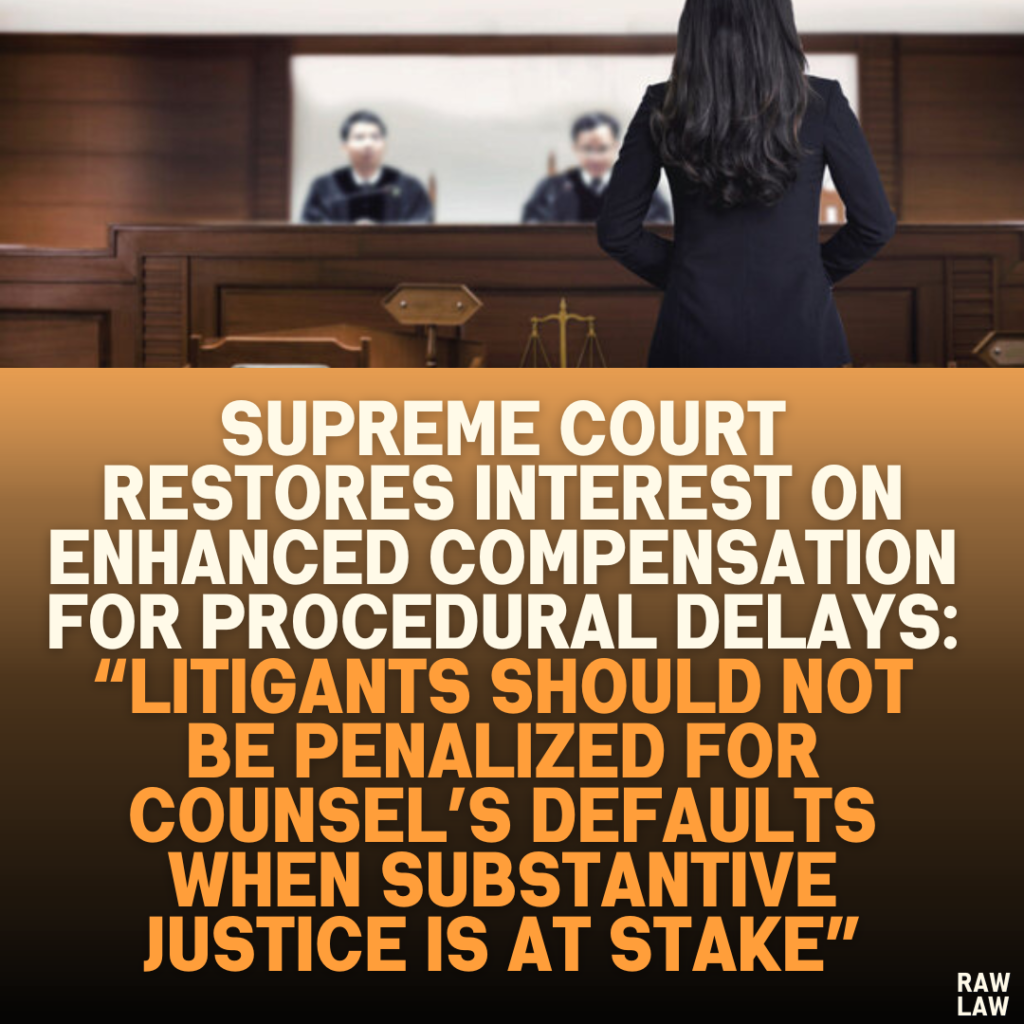Court’s Decision:
The Supreme Court partly allowed the appeal and modified the High Court’s judgment. It restored interest on the enhanced compensation for the period from June 22, 2016, to July 13, 2023. The Court concluded that the appellants-claimants should not be penalized for delays in litigation processes caused by their counsel, emphasizing that substantive justice must prevail over procedural technicalities.
Facts:
The case stems from a fatal road accident on August 7, 2006, involving the deceased, a driver and the family’s sole breadwinner. He was traveling in a jeep with his wife and children when a bus collided with their vehicle, resulting in his death.
The appellants-claimants, including the deceased’s widow and three daughters, filed a claim before the Motor Accidents Claims Tribunal (MACT), seeking ₹15,00,000 in compensation. The Tribunal awarded ₹4,15,000 with 7.5% interest per annum, holding the driver, owner, and insurer of the bus jointly liable.
Dissatisfied with the compensation, the appellants-claimants appealed to the Kerala High Court. However, the appeal was delayed by 708 days, which the High Court condoned on the condition that no interest would be paid for the period of delay if compensation was enhanced. The High Court subsequently increased the compensation by ₹9,84,500 and imposed 8% interest per annum but denied interest for:
- The 708 days of delay in filing the appeal.
- The period from June 22, 2016, to July 13, 2023, due to the appellants’ counsel’s delay in providing a copy of the paper book to the respondent’s counsel.
Issues:
- Was the denial of interest for the delay in filing the appeal (708 days) justified?
- Was the denial of interest for the period between June 22, 2016, and July 13, 2023, due to procedural lapses by the appellants’ counsel, reasonable?
- Was the High Court’s assessment of compensation adequate?
Petitioner’s Arguments:
- The appellants argued that the High Court’s denial of interest for procedural delays was unjustified since they were not personally at fault.
- They contended that the deceased’s income, assessed at ₹8,750 per month by the High Court, was on the lower side and led to inadequate compensation.
- They highlighted their financial struggles as dependents of the deceased, emphasizing that the fault of their counsel should not prejudice their right to fair compensation and interest.
Respondent’s Arguments:
- The respondents claimed that the High Court had already awarded more than adequate compensation.
- They defended the denial of interest for procedural delays, stating that the appellants bore responsibility for their counsel’s lapses.
Analysis of the Law:
- Compensation Assessment: The Court determined that the deceased’s income was properly assessed, and the enhanced compensation awarded by the High Court was appropriate under the circumstances.
- Interest Denial for Procedural Delays: The Court distinguished between delays attributable directly to appellants and those caused by their counsel. While it upheld the denial of interest for the 708-day delay in filing the appeal, it found the denial of interest for delays in providing the paper book during litigation unjustified.
- Balancing Procedural and Substantive Justice: The Court reiterated that procedural lapses should not undermine substantive justice, particularly when the litigants themselves are not at fault.
Precedent Analysis:
The Court referred to the principle that litigants should not suffer for the negligence of their legal representatives unless there is clear evidence of willful default or negligence on their part. It emphasized the need to protect claimants from being unfairly penalized for procedural inefficiencies.
Court’s Reasoning:
- The Supreme Court reasoned that denying interest for the 708-day delay in filing the appeal was reasonable, as this delay was directly attributable to the appellants.
- However, denying interest for the period from June 22, 2016, to July 13, 2023, due to the delayed submission of a paper book, was unwarranted. The Court observed, “Once the matter is before the Court, claimants should not be penalized for procedural defaults caused by their counsel.”
- The Court underscored that the appellants’ right to just compensation should not be jeopardized by procedural issues beyond their control.
Conclusion:
The Supreme Court modified the High Court’s order to allow interest at 8% per annum for the period from June 22, 2016, to July 13, 2023, on the enhanced compensation. The appeal was partly allowed, and no costs were imposed.
Implications:
- Clarification on Procedural Defaults: The judgment highlights that procedural delays caused by counsel cannot be grounds for denying substantive rights, such as interest on compensation.
- Balancing Justice: It reinforces the judiciary’s commitment to balancing procedural requirements with the need to deliver substantive justice.
- Guidance for Future Cases: The decision sets a precedent for ensuring that litigants are not penalized for their legal representatives’ procedural lapses.
This ruling affirms the principle that justice should not be sacrificed on the altar of procedural strictness, especially in cases involving claims for just compensation.




Pingback: Delhi High Court Validates ₹247 Crore Long-Term Capital Gains Exemption: Clarifies Interplay Between Section 10(38) and Section 115JB, Rules LTCG Exemption Under Normal Provisions Unaffected by MAT Inclusion - Raw Law
Pingback: Delhi High Court Upholds Validity of Land Acquisition for Okhla Vihar Metro Station: Procedural Lapses in Notices Under Sections 9 and 10 Do Not Invalidate Award Issued Before the 2013 Act’s Enforcement - Raw Law